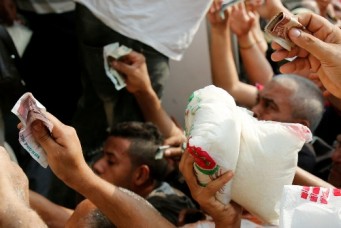Another Hollow Arab ‘reform’ Promise”
Despite a few Arab dictators having been toppled or challenged by their own disgruntled citizens, the remaining ones appear not to have learned any lessons, and persist in their cruel ways in one hapless country after another.
The humiliations and scorn that many Arab leaders heap on their populations seem to have no end. Despite a few Arab dictators having been toppled or challenged by their own disgruntled citizens, the remaining ones appear not to have learned any lessons, and persist in their cruel ways in one hapless country after another.
They seize power through military coups, control all government power through a web of security agencies and the armed forces, drive the economy into the ground, wreak havoc with the environment, drain cultural and educational life of their vitality, shut down any credible political life, siphon off massive amounts of money for themselves and their cronies, cause the smartest young men and women to emigrate to a better life in other countries, and ultimately send the majority of their citizens into a downward cycle of pauperization, marginalization, vulnerability and existential fear. This goes on for decades, until the country implodes like Somalia, acts so brutally that it is invaded and shattered like Iraq or Libya, sinks into internal warfare like Yemen or Syria, or sees its own citizens rise up in revolt in search of their rights and dignity, like Tunisia, Egypt and several others to smaller degrees.
I mentioned recently the pitiful aged and ailing Algerian President Abdelaziz Bouteflika, who insists on claiming a fourth consecutive term in office, which of course he will obtain because the “elections” for the post will be configured to produce his victory. The latest sad example is the president of Sudan, Omar Hassan Bashir, who also assumed power through a military coup, has been president for a quarter of a century—25 years—and has committed just about every mistake and crime that a national leader can commit against his own people.
His list of misrule and cruelty was capped by his indictment a few years ago by the International Criminal Court for war crimes and crimes against humanity in the war in Darfur that has killed and displaced millions of Sudanese—and still goes on today. He is such a disliked leader that some of his own nationals formally seceded and created their own country of South Sudan in 2011.
Now he adds insult to injury by announcing this week that he seeks to implement some political reforms, and says that to start this process he will release political prisoners and ease restrictions on political parties. The aim of this, he says, is to “encourage success in a national dialogue.”
It is impossible to take seriously the idea that a man with Bashir’s track record of grinding autocracy and decades of sustained warfare against his own people in places like Darfur and the south can suddenly change and implement a political reform process leading to a more pluralistic or democratic system in Sudan.
“The aim behind the decisions is preparing the stage for dialogue between the political parties for reaching a comprehensive peace in Sudan,” he was quoted as saying by Sudanese television. But here comes the reality that gives this away as a hollow process: He said he had “directed the authorities concerned in all the states and local governments across Sudan to allow the Sudanese parties to exercise their political activities inside and outside their headquarters without restrictions, within the parameters of the law.”
The “within the parameters of the law” clause is the technique that every Arab autocrat has used for the past half century to maintain his unfettered power and prohibit any credible political activity by opposition parties or civil society groups. This is because Bashir controls all the mechanisms that make, interpret and enforce the law, and define its parameters. Which means that Sudanese political parties will not have any serious leeway for action that opposes his ruling circle’s wishes or its hold on power.
This approach of feigned reforms from the top has been used by most Arab autocrats during the past half century of rule, and never, ever, has it resulted in real change. Talk of reform or political pluralism is what Arab dictators do when they feel they are being pressured by their own people, as Bashir is these days. It was not surprising, therefore, that just as Bashir was announcing his move to increase political activity and liberties in the country, the leading opposition Reform Now party charged that government security agents had detained a leader of its student wing and prevented the holding of a party meeting at a university.
Many opposition groups have also refused to join the “dialogue” until all their conditions are met, including moves to free prisoners, end internal conflicts, and create a transitional government. Among those refusing the dialogue proposal is the Sudanese opposition alliance, a coalition of 17 parties led by the Communist party.
Rami G. Khouri is Editor-at-large of The Daily Star, and Director of the Issam Fares Institute for Public Policy and International Affairs at the American University of Beirut, in Beirut, Lebanon. On Twitter: @ramikhouri.
Copyright © 2014 Rami G. Khouri—distributed by Agence Global



